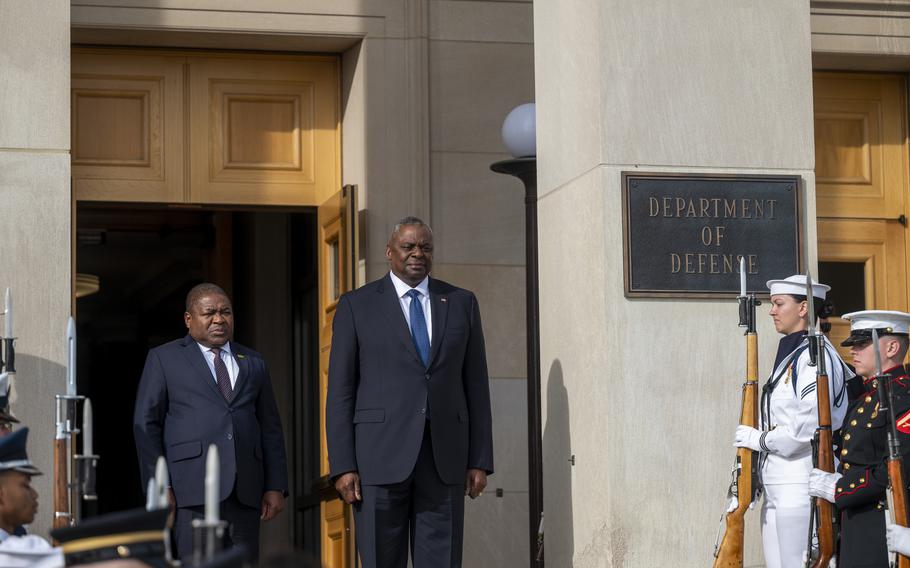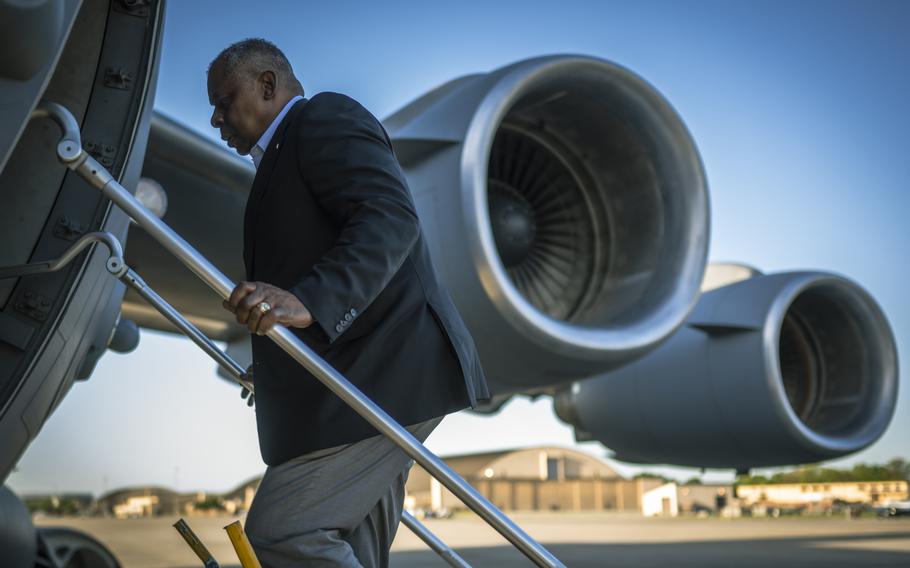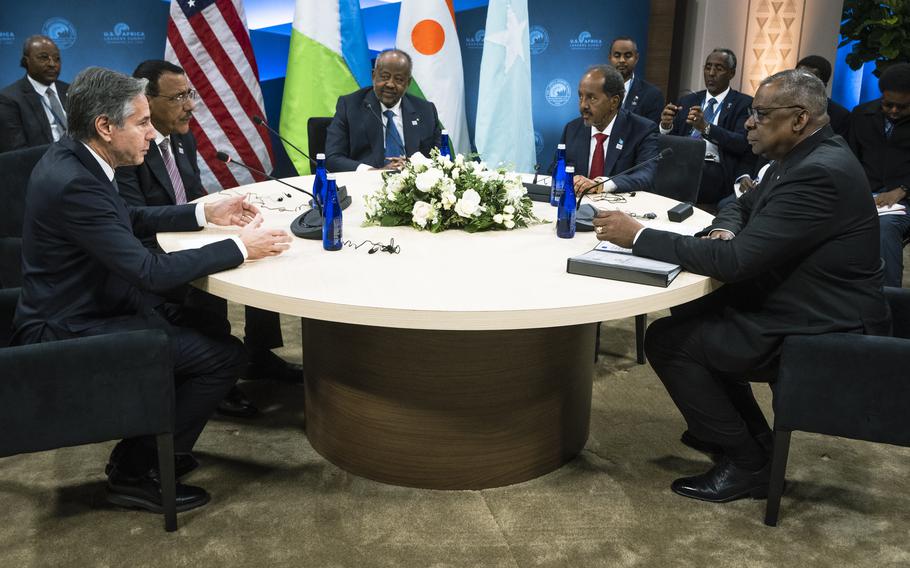
Defense Secretary Lloyd Austin and Mozambique President Filipe Nyusi stand for the playing of the U.S. and Mozambiqua national anthems at the Pentagon on Friday, Sept. 22, 2023. (Cesar J. Navarro/Air Force)
WASHINGTON – Defense Secretary Lloyd Austin is traveling to Africa next week to shore up U.S. defense relationships with allies during a time of heightened bloodshed across the continent and growing influence in the region from China and Russia.
“Secretary Austin will travel to Africa … to underscore the United States’ commitment to building and reinforcing security partnerships with African nations and to promote African-led initiatives and regional solutions to security issues,” said Air Force Brig. Gen. Pat Ryder, the Pentagon’s top spokesman.
Austin will leave for the trip on Saturday and return Thursday, the Defense Department said. He will visit two countries in eastern Africa – Kenya and Djibouti – and Angola, a large nation on the continent’s southwestern coastline. The visit will take Austin and other military officials near one trouble spot – Sudan – where there’s an ongoing power struggle between two military factions that sacked the civilian government two years ago. The bloody conflict forced the Pentagon to quickly remove American personnel at the U.S. Embassy there and other civilians from the country.
This week, members of each faction – the Sudanese Armed Forces and the paramilitary Rapid Support Forces – gave competing addresses at the 78th United Nations General Assembly in New York -- blaming each other for the conflict, which is now in its sixth month.
Djibouti is a small country in the Horn of Africa that borders the Red Sea to the northwest and Sea of Oman to the northeast, placing it near some of the world’s busiest shipping lanes. There, Austin will meet with senior Djiboutian officials to “discuss ongoing military cooperations” and examine regional security challenges, the Pentagon said. Last month, Austin promised President Ismail Omar Guelleh a strong defense partnership in view of ongoing turmoil in Sudan just 420 miles to Djibouti’s northwest. To the east, Djibouti shares a border with Somalia, a country that’s seen a rise in terrorism for decades, especially from the al-Shabab group.
Austin’s trip will also take him to Kenya, which also isn’t far from the conflict in Sudan. There, he will engage with defense officials in Nairobi on shared problems and counter-terrorism efforts, officials said. Kenya also shares a border with Somalia, as well as Uganda, another nation that’s seen a rise in terrorism in recent years. In 2021, the U.S. government documented several terrorist attacks in the country after more than a decade of relative peace.

Defense Secretary Lloyd Austin departs Joint Base Andrews, Md., for Stockholm, Sweden, on April 18, 2023. (Chad J. McNeeley/DoD)
The third country on Austin’s itinerary is Angola, which in recent years has taken several steps to counter terrorism. There, the U.S. defense secretary will explore avenues for what the Pentagon called greater “military-to-military cooperation.”
Austin also will take time to meet with U.S. military personnel during the stops in Kenya and Djibouti, officials said.
His trip comes in the aftermath of a military coup in Niger in July. The Pentagon has said it is monitoring the situation but stressed earlier this month that there’s no threat to U.S. troops who are stationed in the northwestern African nation. About 1,100 U.S. personnel are in Niger, though the Pentagon said they “have been sidelined by the military takeover.” Austin’s office has said the U.S. hopes the situation in Niger can be resolved diplomatically.
Compounding U.S. concerns across Africa is the deepening influence coming from China and Russia, American officials have said. At the U.S. African Leaders Summit last December, Austin said both countries are “destabilizing” Africa with their economic and military influence. China, for example, has become one of Africa’s largest trading partners.
“China promised additional support to combat COVID-19 and announced a goal to increase its imports from Africa to a total of $300 billion in the next three years,” the House Foreign Affairs Committee said in the fall. “Africa has also passed Asia as the largest market for China’s overseas construction projects.”
Meanwhile, a recent report from the Africa Center for Strategic Studies said: “Russia has arguably expanded its influence in Africa in recent years more than any other external actor. These engagements extend from deepening ties in North Africa, expanding its reach in the Central African Republic and the Sahel, and rekindling Cold War ties in southern Africa.”
The center, which is a Pentagon academic institution that studies African security issues, said Russia “typically relies on irregular (and frequently extralegal) means to expand its influence -- deployment of mercenaries, disinformation, election interference, support for coups and arms for resources deals.”
A recent example of that kind of influence is the Wagner Group, a Russian private military company that’s used mercenaries and criminals for paramilitary purposes around the world, including Africa. Wagner has carried out operations in Syria, for example, in support of President Bashar Assad. Wagner has also operated in Sudan, the Central African Republic, Libya and Mali. The group became widely known after it began fighting for Russia following Moscow’s invasion of Ukraine in early 2022.

Secretary of State Antony Blinken and Defense Secretary Lloyd Austin host a meeting with (left to right) President Mohamed Bazoum of Niger, President Ismail Omar Guelleh of Djibouti and President Hassan Sheikh Mohamud of Somalia at the Africa Leaders Summit in Washington, D.C., on Dec. 13, 2022. (Chad J. McNeeley/DoD)
“Russia’s influence in Africa is here to stay,” the Center For Strategic and International Studies, a Washington think tank that studies security issues, said in a report last month. “While the U.S.-led effort to form a global coalition aimed at isolating Russia internationally has indeed strengthened the transatlantic alliance, it has not yet fully convinced the rest of the world, including countries on the African continent, to break ties with Moscow.”
Russia is the chief arms supplier to Africa, accounting for 40% of African imports of major weapons systems between 2018 and 2022, more than the U.S., the report said.
Since becoming President Joe Biden’s defense secretary in early 2021, Austin has repeatedly expressed alarm at the widening influence of China and Russia across Africa.
“China is expanding its military and economic footprint -- and seeking to build bases in Africa and to undermine U.S. relations with African peoples, governments, and militaries. Meanwhile, Russia is peddling cheap weapons and backing mercenary forces,” Austin said recently. “We are committed to ensuring that Africa enjoys the protections of the international rules and norms that advance all of our safety and prosperity. And that gives the nations of Africa a clear-eyed choice of partners.”